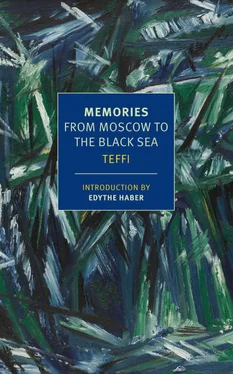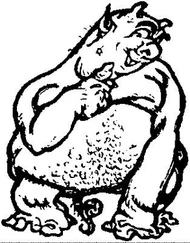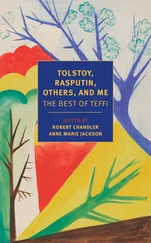The look on her face is serious, almost tragic.
I hate the word “never.” Were someone to tell me that I’ll never again get a headache, even that would probably scare me.
I do as I’m told. I buy the luxurious scrap of cloth with the seven nails.
•
Those last days were strange indeed.
At night we hurried past the dark houses, down streets where people were strangled and robbed. We hurried to listen to Silva [10] Silva (known in English as The Riviera Girl or The Gipsy Princess ), an operetta by the Hungarian composer Emmerich Kalman (1882–1953), was premiered in Vienna in November 1915. It remains popular in Hungary, Austria, and Germany and was made into a successful film in the Soviet Union.
or else to sit in down-at-heel cafés packed with people in shabby coats that stank of wet dog. There we listened to young poets reading—or rather howling—their own and one another’s work; they sounded like hungry wolves. There was quite a vogue for these poets, and even the haughty Bryusov would sometimes deign to introduce one of their “Evenings of Eros.” [11] Valery Bryusov was one of the founders of Russian Symbolism. Always an influential figure, he joined the Communist Party in 1920. There are several accounts of his abusing his position in the Soviet cultural apparatus to attack more gifted colleagues.
Everyone wanted company, to be in the presence of other people.
To be alone and at home was frightening.
We had to know what was going on; we needed to keep hearing news of one another. Sometimes someone would disappear and then it would be almost impossible to find out what had happened to them. Had they gone to Kiev? Or to the place from which there was no return?
It was as if we were living in the tale about Zmey Gorynych, the dragon that required a yearly tribute of twelve fair maidens and twelve young men. [12] This three-headed dragon appears in one of the most famous Russian byliny or heroic songs.
One might well wonder how the people in this tale could have carried on, how they could have lived with the knowledge that a dragon would soon be devouring the finest of their children. During those last days in Moscow, however, we realized that they too had probably been rushing from one little theater to another or hurrying to buy themselves something from which to make a coat or a dress. There is nowhere a human being cannot live. With my own eyes I have seen sailors taking a man out onto the ice in order to shoot him—and I have seen the condemned man hopping over puddles to keep his feet dry and turning up his collar to shield his chest from the wind. Those few steps were the last steps he would ever take, and instinctively he wanted to make them as comfortable as possible.
We were no different. We bought ourselves some “last scraps” of fabric. We listened for the last time to the last operetta and the last exquisitely erotic verses. What did it matter whether the verses were good or terrible? All that mattered was not to know, not to be aware—we had to forget that we were being led onto the ice.
News came from Petersburg that the Cheka [13] The Soviet security services were originally called the “Extraordinary Committee” or Cherezvychainy komitet , usually shortened to Cherezvychaika or Cheka . Later acronyms were the OGPU, the NKVD, and the KGB.
had arrested a well-known actress for reading my short stories in public. She was ordered to read one of the stories again, before three dread judges. You can imagine what fun it was for her to stand between guards with bayonets and declaim my comic monologue. And then—miracle of miracles!—after her first few trembling sentences, the face of one of the judges dissolved into a smile.
“I heard this story one evening at comrade Lenin’s. It’s entirely apolitical.”
Reassured by this, the judges asked the suspect—who was, of course, also greatly reassured—to continue her reading, “by way of revolutionary entertainment.”
Still, all in all, it probably wasn’t such a bad idea to be going away, even if only for a month. For a change of climate.
By now Gooskin was proving his worth more than ever. Perhaps more from nerves than from any real need. One morning, for some reason, he had been over to see Averchenko.
“It was awful,” he told me, waving his hands in the air. “At ten o’clock this morning I hurried over to see Averchenko—and what did I find? He was snoring—snoring cats and dogs! He’s going to miss the train!”
“But I thought we weren’t leaving for another five days.”
“The train leaves at ten o’clock. If he sleeps like that today, then what’s to stop him from sleeping like that a week from now? He’ll be sleeping like that his whole life. He’ll be sleeping—and we’ll be waiting. Wonderful!”
Gooskin dashed about. He got more and more agitated. He moved faster and faster. He flapped his hands in the air, like a broken belt drive. But had it not been for his frenzied energy, who knows how my life would have turned out? Wherever you are, O my pseudonymous Gooskin, I send you my greetings!
THE DAY for our departure was constantly being postponed.
First, there would be delays with someone’s travel permit. Then it would turn out that our hope of hopes, our Nose-in-Boots, had yet to return to his frontier post.
My own preparations were more or less complete. My trunk was now full. Another trunk, in which I had packed a number of old Russian shawls (the latest of my crazes), had been stowed away in Lolo’s apartment.
But what if the authorities suddenly declared some “Week of Poverty”—or, for that matter, a “Week of Elegance”—and all these shawls were confiscated?
In the event of trouble, I asked Lolo to state that the trunk was of proletarian origin, that it belonged to Fedosya, his former cook. And to make all this more convincing and to ensure that the trunk was treated with proper respect, I put a portrait of Lenin inside it, with the inscription, “Darling Fedosya, whose memory I shall treasure with the deepest affection. Your loving Vova.” [14] “Vova” is an affectionate form of the name “Vladimir.” The intentionally ludicrous implication is that Fedosya received this shawl and portrait as a gift from Lenin himself.
Not even these measures proved of any help.
Those last Moscow days passed by in a turbid whirl. People appeared out of the mist, spun around and faded from sight; then new people appeared. It was like standing on a riverbank in the spring twilight and watching great blocks of ice float past: On one block is something that could be either a cart packed with straw or a Ukrainian peasant hut; on another block are scorched logs and something that looks like a wolf. Everything spins around a few times and then the current sweeps it away forever. And never will you learn what it really was.
Various engineers, doctors, and journalists made brief appearances. Now and then some actress or other would show up.
A landowner I knew passed through on his way from Petersburg to his estate in Kazan. From Kazan he wrote that the peasants had looted his home and that he had been doing the rounds of their huts buying back his paintings and books. In one hut he had seen a miracle: a portrait of me painted by Schleifer, [15] Savely Schleifer (1881–1943). Born in Odessa, Schleifer studied there and in Petersburg. After living in Paris from 1905 to 1907, he returned to Petersburg. He taught there after the revolution but emigrated to Paris in 1927. Arrested by the Nazis soon after the outbreak of World War II, he died in Auschwitz.
hanging in the icon corner next to Saint Nicholas the Miracle Worker. The woman who had been allotted this portrait had taken it into her head that I was a holy martyr.
Читать дальше












